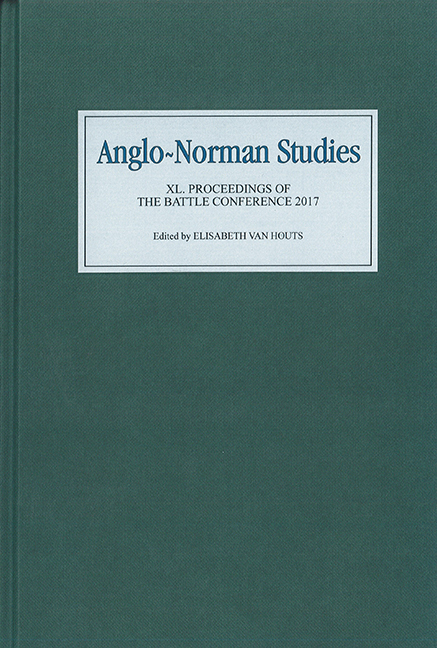Book contents
- Frontmatter
- Contents
- Illustrations and tables
- Editor's preface
- Abbreviations
- The R. Allen Brown Memorial Lecture, 2017
- The R. Allen Brown Memorial Lecture, 2016
- The Marjorie Chibnall Memorial Essay, 2017
- Becket vult: the Appropriation of St Thomas Becket's Image during the Canterbury Dispute, 1184–1200 (The Marjorie Chibnall Memorial Essay)
- La Bataille de Bouvines reconsiderée
- Abbot Peter the Venerable's Two Missions to England (1130 and 1155/1156)
- La production manuscrite anglo-normande et la Bible d'Herman de Valenciennes: usage et réception d'un livre vernaculaire (xii e–xiv e siècles)
- Ralph Niger and the Books of Kings
- From Captivity to Liberation: the Ideology and Practice of Franchise in Crusading France
- Daughter of Fulk, Glory of Brittany’: Countess Ermengarde of Brittany (c.1070–1147)
- The Idea of ‘Empire’ as Hegemonic Power under the Norman and Plantagenet Kings (1066–1204)
- Child Kingship and Notions of (Im)maturity in North-Western Europe, 1050–1262
- Note: A Micro-Economy of Salvation: Further Thoughts on the ‘Annuary’ of Robert of Torigni
Ralph Niger and the Books of Kings
from The Marjorie Chibnall Memorial Essay, 2017
Published online by Cambridge University Press: 17 July 2018
- Frontmatter
- Contents
- Illustrations and tables
- Editor's preface
- Abbreviations
- The R. Allen Brown Memorial Lecture, 2017
- The R. Allen Brown Memorial Lecture, 2016
- The Marjorie Chibnall Memorial Essay, 2017
- Becket vult: the Appropriation of St Thomas Becket's Image during the Canterbury Dispute, 1184–1200 (The Marjorie Chibnall Memorial Essay)
- La Bataille de Bouvines reconsiderée
- Abbot Peter the Venerable's Two Missions to England (1130 and 1155/1156)
- La production manuscrite anglo-normande et la Bible d'Herman de Valenciennes: usage et réception d'un livre vernaculaire (xii e–xiv e siècles)
- Ralph Niger and the Books of Kings
- From Captivity to Liberation: the Ideology and Practice of Franchise in Crusading France
- Daughter of Fulk, Glory of Brittany’: Countess Ermengarde of Brittany (c.1070–1147)
- The Idea of ‘Empire’ as Hegemonic Power under the Norman and Plantagenet Kings (1066–1204)
- Child Kingship and Notions of (Im)maturity in North-Western Europe, 1050–1262
- Note: A Micro-Economy of Salvation: Further Thoughts on the ‘Annuary’ of Robert of Torigni
Summary
The commentary by Ralph Niger on the Books of Samuel and Kings survives in a single copy kept in the library of Lincoln Cathedral. In this work, Niger sets about providing a complex literal gloss on these historical books of the Bible, as well as using allegorical, tropological (or moral), and anagogical (referring to superior things) interpretations. The exposition of all possible literal meanings, with a view to etymology, and the lack of any systematic arrangement account for the unusual length of this commentary, which fills two volumes (MSS 25 and 26) of 188 and 174 folios respectively, the text being written in two columns of sixty lines each. The way Ralph Niger stacks up different layers of interpretation may baffle the reader, even when taking into account the rules of the genre, and his approach is often obscured by ambiguity. A number of indications, however, show that he conceived his commentary as dominated by tropological interpretation. In his universal chronicle, having just written about the prophetic writings of Joachim of Fiore and of Geoffrey of Auxerre, former abbot of Clairvaux, on the Apocalypse, he refers to this earlier work as Moralia Regum, among other works of his, including an epithome of the Old Testament, as well as commentaries on Chronicles and Ezra. In a general address to the Roman cardinals placed at the beginning of MS 25, he explains that since the varieties of governments find their origin in the morality of men, he has chosen from the start to study the moralia of kings, whose authority and example provide instruction for all others, as a community and as individuals. A few lines further down, he states that since the movements of the soul spring from morals, and since the rights of governments proceed from the movements of princes, he considers it a useful endeavour, in order to distinguish the one from the other, to discuss the moralia regum, for there is no doubt that governments (regiminum moderamina) are formed according to them. In both cases, Niger refers to the moral actions of kings. In the following sections of the commentary, however, moralia is used in wider contexts. For instance, in Book II, on 1 Sam 7, 5, Niger explains that having left the house of Sacred Scripture, Samuel taught moralia by the example of his life.
- Type
- Chapter
- Information
- Anglo-Norman Studies XLProceedings of the battle conference 2017, pp. 125 - 146Publisher: Boydell & BrewerPrint publication year: 2018



